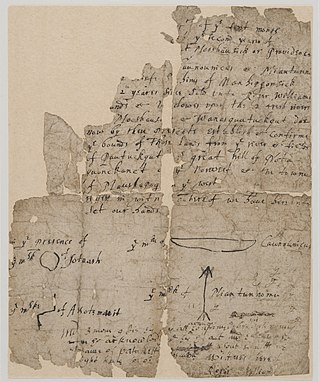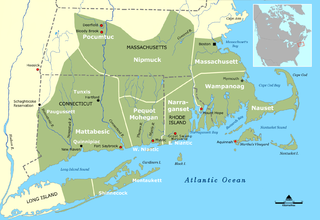
The Eleventh Amendment is an amendment to the United States Constitution which was passed by Congress on March 4, 1794, and ratified by the states on February 7, 1795. The Eleventh Amendment restricts the ability of individuals to bring suit against states in federal court.
Board of Trustees of the University of Alabama v. Garrett, 531 U.S. 356 (2001), was a United States Supreme Court case about Congress's enforcement powers under the Fourteenth Amendment to the United States Constitution. The Supreme Court decided that Title I of the Americans with Disabilities Act was unconstitutional, insofar as it allowed states to be sued by private citizens for money damages.

The Coeur d'Alene Tribe are a Native American tribe and one of five federally recognized tribes in the state of Idaho.

The Coeur d'Alene Reservation is a Native American reservation in northwestern Idaho, United States. It is home to the federally recognized Coeur d'Alene, one of the five federally recognized tribes in the state.
The Nonintercourse Act is the collective name given to six statutes passed by the Congress in 1790, 1793, 1796, 1799, 1802, and 1834 to set Amerindian boundaries of reservations. The various Acts were also intended to regulate commerce between settlers and the natives. The most notable provisions of the Act regulate the inalienability of aboriginal title in the United States, a continuing source of litigation for almost 200 years. The prohibition on purchases of Indian lands without the approval of the federal government has its origins in the Royal Proclamation of 1763 and the Confederation Congress Proclamation of 1783.
Ex parte Young, 209 U.S. 123 (1908), is a United States Supreme Court case that allows suits in federal courts for injunctions against officials acting on behalf of states of the union to proceed despite the State's sovereign immunity, when the State acted contrary to any federal law or contrary to the Constitution.
Hans v. Louisiana, 134 U.S. 1 (1890), was a decision of the United States Supreme Court determining that the Eleventh Amendment prohibits a citizen of a U.S. state to sue that state in a federal court. Citizens cannot bring suits against their own state for cases related to the federal constitution and federal laws. The court left open the question of whether a citizen may sue his or her state in state courts. That ambiguity was resolved in Alden v. Maine (1999), in which the Court held that a state's sovereign immunity forecloses suits against a state government in state court.
Seminole Tribe of Florida v. Florida, 517 U.S. 44 (1996), was a United States Supreme Court case which held that Article One of the U.S. Constitution did not give the United States Congress the power to abrogate the sovereign immunity of the states that is further protected under the Eleventh Amendment. Such abrogation is permitted where it is necessary to enforce the rights of citizens guaranteed under the Fourteenth Amendment as per Fitzpatrick v. Bitzer. The case also held that the doctrine of Ex parte Young, which allows state officials to be sued in their official capacity for prospective injunctive relief, was inapplicable under these circumstances, because any remedy was limited to the one that Congress had provided.

Lake Coeur d'Alene, officially Coeur d'Alene Lake, is a natural dam-controlled lake in North Idaho, located in the Pacific Northwest region of the United States. At its northern end is the city of Coeur d'Alene. It spans 25 miles (40 km) in length and ranges from 1 to 3 miles (5 km) wide with over 109 miles (175 km) of shoreline.
Kimel v. Florida Board of Regents, 528 U.S. 62 (2000), was a US Supreme Court case that determined that the US Congress's enforcement powers under the Fourteenth Amendment to the US Constitution did not extend to the abrogation of state sovereign immunity under the Eleventh Amendment over complaints of discrimination that is rationally based on age.
Will v. Michigan Dept. of State Police, 491 U.S. 58 (1989), was a case decided by the United States Supreme Court, in which the Court held that States and their officials acting in their official capacity are not persons when sued for monetary damages under the Civil Rights Act of 1871.

In United States law, the federal government as well as state and tribal governments generally enjoy sovereign immunity, also known as governmental immunity, from lawsuits. Local governments in most jurisdictions enjoy immunity from some forms of suit, particularly in tort. The Foreign Sovereign Immunities Act provides foreign governments, including state-owned companies, with a related form of immunity—state immunity—that shields them from lawsuits except in relation to certain actions relating to commercial activity in the United States. The principle of sovereign immunity in US law was inherited from the English common law legal maxim rex non potest peccare, meaning "the king can do no wrong." In some situations, sovereign immunity may be waived by law.

The United States was the first jurisdiction to acknowledge the common law doctrine of aboriginal title. Native American tribes and nations establish aboriginal title by actual, continuous, and exclusive use and occupancy for a "long time." Individuals may also establish aboriginal title, if their ancestors held title as individuals. Unlike other jurisdictions, the content of aboriginal title is not limited to historical or traditional land uses. Aboriginal title may not be alienated, except to the federal government or with the approval of Congress. Aboriginal title is distinct from the lands Native Americans own in fee simple and occupy under federal trust.
Ex parte Crow Dog, 109 U.S. 556 (1883), is a landmark decision of the Supreme Court of the United States that followed the death of one member of a Native American tribe at the hands of another on reservation land. Crow Dog was a member of the Brulé band of the Lakota Sioux. On August 5, 1881 he shot and killed Spotted Tail, a Lakota chief; there are different accounts of the background to the killing. The tribal council dealt with the incident according to Sioux tradition, and Crow Dog paid restitution to the dead man's family. However, the U.S. authorities then prosecuted Crow Dog for murder in a federal court. He was found guilty and sentenced to hang.
County of Oneida v. Oneida Indian Nation of New York State, 470 U.S. 226 (1985), was a landmark United States Supreme Court case concerning aboriginal title in the United States. The case, sometimes referred to as Oneida II, was "the first Indian land claim case won on the basis of the Nonintercourse Act."

The Narragansett land claim was one of the first litigations of aboriginal title in the United States in the wake of the U.S. Supreme Court's landmark Oneida Indian Nation of New York v. County of Oneida (1974), or Oneida I, decision. The Narragansett claimed a few thousand acres of land in and around Charlestown, Rhode Island, challenging a variety of early 19th century land transfers as violations of the Nonintercourse Act, suing both the state and private land owners.
United States v. Lee, 106 U.S. 196 (1882), is a 5-to-4 ruling by the United States Supreme Court which held that the Constitution's prohibition on lawsuits against the federal government did not extend to officers of the government themselves. The case involved the heir of Mary Anna Custis Lee, wife of Confederate States of America General Robert E. Lee, who sued to regain control of Arlington House and its grounds. Arlington had been seized by the United States government in 1861 and eventually converted into Arlington National Cemetery. The estate had been sold to pay outstanding taxes, but the lawsuit contested the tax sale as improper. A jury found in favor of the Lees. The Supreme Court, too, concluded that the tax sale was illegal. In stripping the federal officers of their sovereign immunity, the Supreme Court agreed that suit against them was proper.
Idaho v. United States, 533 U.S. 262 (2001), was a United States Supreme Court case in which the Court held that the United States, not the state of Idaho, held title to lands submerged under Lake Coeur d'Alene and the St. Joe River, and that the land was held in trust for the Coeur d'Alene Tribe as part of its reservation, and in recognition of the importance of traditional tribal uses of these areas for basic food and other needs.
United States v. Antelope, 430 U.S. 641 (1977), was a United States Supreme Court case in which the Court held that American Indians convicted on reservation land were not deprived of the equal protection of the laws; (a) the federal criminal statutes are not based on impermissible racial classifications but on political membership in an Indian tribe or nation; and (b) the challenged statutes do not violate equal protection. Indians or non-Indians can be charged with first-degree murder committed in a federal enclave.

The Coeur d'Alene Casino is a Native American gaming enterprise run by the Coeur d'Alene people on the Coeur d'Alene Reservation in Kootenai County, Idaho, United States, northwest of Worley. The resort includes two hotel towers, the Circling Raven Golf Club, multiple restaurants, and 100,000 square feet (9,300 m2) of casino floor space. The Coeur d'Alene Casino is currently one of the largest employers in the Idaho region.









